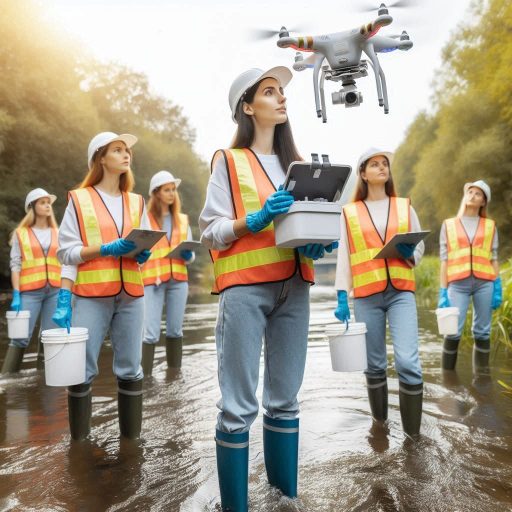Introduction
Conferences and events play a crucial role for hydrologists.
They provide essential platforms for networking and knowledge sharing.
Attending these gatherings helps professionals stay updated on the latest research and technologies.
Networking opportunities abound at conferences, allowing hydrologists to connect with peers and industry leaders.
These interactions can lead to collaborations and new career opportunities.
Furthermore, participating in workshops and panel discussions enhances professional development.
Staying informed about emerging trends and breakthroughs in hydrology is vital for career success.
Conferences often feature presentations from experts, showcasing cutting-edge research and innovative technologies.
In this blog post, we will highlight some top conferences and events for hydrologists.
Notable events include the American Geophysical Union (AGU) Fall Meeting and the Geological Society of America Annual Meeting.
These gatherings attract professionals from around the world, fostering collaboration and knowledge exchange.
We will also discuss regional events and specialized workshops that cater to specific hydrological interests.
By participating in these conferences, hydrologists can enhance their skills and contribute to the advancement of the field.
AGU Fall Meeting
The Largest Earth and Space Science Meeting
One of the premier conferences for hydrologists is the American Geophysical Union (AGU) Fall Meeting.
This event is the largest earth and space science meeting globally.
Each year, thousands of scientists gather to share knowledge and advancements in their fields.
The AGU Fall Meeting covers diverse topics, including hydrology, atmospheric sciences, and geophysics.
Attendees come from around the world, representing various disciplines.
This gathering offers hydrologists a unique opportunity to engage with experts across multiple sectors.
The breadth of topics allows for interdisciplinary discussions, fostering collaboration and innovation.
Presentations, Workshops, and Networking Opportunities
The AGU Fall Meeting features numerous presentations and workshops.
These sessions allow hydrologists to showcase their research findings to a global audience.
Participants can attend oral presentations and poster sessions tailored to their specific interests.
These presentations provide valuable insights into current trends and challenges in hydrology.
Workshops are an essential part of the conference.
They offer hands-on training in new methodologies, technologies, and data analysis techniques.
Hydrologists can enhance their skills and knowledge, staying current in their field.
These workshops encourage networking among participants.
Networking opportunities abound at the AGU Fall Meeting.
Attendees can meet professionals, researchers, and industry leaders during various sessions and social events.
These interactions can lead to collaborative research projects and career advancement.
Building connections is crucial for hydrologists seeking to expand their professional network.
A Great Platform for Sharing Research Findings
The AGU Fall Meeting serves as a fantastic platform for sharing research findings.
Researchers can present their work to an engaged audience of peers and experts.
This exposure can lead to constructive feedback and new ideas.
Sharing findings helps advance the collective knowledge in hydrology and related fields.
Furthermore, the meeting emphasizes the importance of collaboration.
Hydrologists can engage with others working on similar projects.
This collaboration often results in joint publications and research initiatives.
By working together, researchers can tackle complex challenges more effectively.
In addition to the AGU Fall Meeting, other conferences also offer valuable experiences.
The American Water Resources Association (AWRA) Annual Water Resources Conference provides another excellent venue.
AWRA focuses on interdisciplinary approaches to water resource management, bringing together professionals from various fields.
The AGU Fall Meeting is the largest earth and space science conference, providing valuable opportunities for hydrologists.
Attendees benefit from presentations, workshops, and networking events that enhance their knowledge and skills.
This platform allows professionals to share research findings and collaborate with experts.
By participating in these events, hydrologists can stay informed about the latest developments and connect with peers.
Engaging with the scientific community is vital for advancing knowledge and fostering innovation in hydrology.
Read: Day in the Life: An Environmental Scientist‘s Typical Day
World Water Week
Annual Event in Stockholm, Sweden
The Stockholm World Water Week is a premier annual event focusing on global water issues.
This prestigious conference takes place in Stockholm, Sweden.
It attracts experts, policymakers, and practitioners from around the world.
Attendees gather to share knowledge, experiences, and innovative solutions related to water management.
The event fosters collaboration among various sectors, including government, academia, and industry.
Seminars, Workshops, and Discussions
The conference features a wide range of seminars, workshops, and discussions on water-related topics.
Participants can choose from various sessions that cover pressing water issues.
Experts lead discussions on sustainable water management, climate change impacts, and water policy development.
Workshops provide hands-on opportunities to learn about best practices and innovative technologies.
Networking events are an essential component of the conference.
Attendees can connect with peers and experts in informal settings.
These interactions often lead to valuable collaborations and partnerships.
Participants can also engage with exhibitors showcasing the latest advancements in water technology.
The event emphasizes the importance of interdisciplinary approaches to water challenges.
Hydrologists can gain insights from professionals in various fields, such as engineering, environmental science, and public health.
This collaboration enhances their understanding of the complexities surrounding water management.
Ideal for Hydrologists Interested in Global Water Management and Sustainability
The Stockholm World Water Week is ideal for hydrologists interested in global water management and sustainability.
Attending this conference helps hydrologists stay updated on the latest research and trends.
They can learn from leading experts and gain insights into emerging issues in the field.
Moreover, hydrologists can share their research findings and experiences with a global audience.
Presenting at the conference enhances their visibility and credibility within the hydrology community.
This exposure can lead to new opportunities for collaboration and research funding.
The event also addresses crucial topics like water scarcity, pollution, and climate change.
Hydrologists can participate in discussions that explore innovative solutions to these challenges.
Engaging with diverse perspectives enriches their understanding of global water issues.
In addition to formal presentations, the conference fosters informal discussions and networking.
Hydrologists can connect with professionals from different countries and backgrounds.
These connections often lead to collaborative research projects and partnerships.
The Stockholm World Water Week is a vital event for hydrologists.
It provides a platform to explore global water issues, share knowledge, and foster collaboration.
Through seminars, workshops, and discussions, hydrologists can gain valuable insights into water management and sustainability.
This annual event not only enhances their professional development but also contributes to global efforts in addressing water-related challenges.
Attending the conference can significantly impact their careers and the field of hydrology.
Read: Earning Potential: Chemist Salaries Across US States
American Water Resources Association (AWRA) Annual Conference
Leading Conference for Water Resources Professionals
Conferences serve as essential platforms for hydrologists and water resource professionals.
One of the leading events in this field is the American Water Resources Association (AWRA) Annual Water Resources Conference.
This conference gathers experts from various backgrounds to discuss critical issues affecting water resources management.
Cutting-Edge Research and Policy Updates
The AWRA conference features sessions on cutting-edge research in hydrology.
Attendees can learn about the latest scientific advancements and methodologies.
Researchers present their findings, showcasing innovative solutions to pressing water-related challenges.
The conference addresses policy updates impacting water resource management.
Keynote speakers from government and non-profit organizations share insights on current legislation and regulations.
Participants gain a comprehensive understanding of how policies shape water management practices.
Sessions also focus on innovative technologies used in water resource management.
Experts present new tools and techniques that improve water quality monitoring and data analysis.
Attendees can explore advancements in remote sensing, modeling, and data management.
This knowledge helps professionals apply the latest technologies in their own work.
Opportunities for Networking and Collaboration
Networking opportunities abound at the AWRA conference.
Professionals from various sectors, including academia, government, and industry, gather to share experiences.
Participants can connect with peers who share similar interests and challenges.
Structured networking sessions allow attendees to meet potential collaborators and mentors.
These interactions can lead to partnerships on research projects and initiatives.
Building relationships with fellow professionals can enhance career opportunities and knowledge exchange.
The conference also hosts poster sessions where attendees can present their research.
This setting encourages informal discussions and feedback on ongoing projects.
Engaging with others in this format fosters a sense of community and collaboration among hydrologists.
Additional Notable Conferences for Hydrologists
Aside from the AWRA conference, other notable events cater to hydrologists.
The American Geophysical Union (AGU) Fall Meeting is one such event.
This gathering attracts thousands of scientists, offering sessions on various topics, including hydrology.
Participants can attend lectures, workshops, and poster sessions to broaden their understanding of current research.
The International Conference on Water Resources and Environment (ICWRE) is another significant event.
This conference focuses on global water issues and promotes sustainable management practices.
Participants can engage in discussions about innovative solutions to water scarcity and quality challenges.
In fact, attending conferences is essential for hydrologists seeking to stay informed and connected.
The AWRA Annual Water Resources Conference stands out as a leading event in the field.
It provides a platform for sharing cutting-edge research, policy updates, and innovative technologies.
Networking opportunities allow professionals to build relationships and collaborate on projects.
Other conferences, like the AGU Fall Meeting and ICWRE, also offer valuable insights and networking prospects.
By participating in these events, hydrologists can enhance their knowledge, contribute to the field, and foster professional growth.
Read: Top Chemistry Departments and Schools in the US

Gain More Insights: Ethics in Epidemiology: Key Considerations
International Conference on Water Management Modeling
Conference Focused on Advances in Water Management Modeling and Simulation
Attending conferences is essential for hydrologists seeking to enhance their knowledge and network.
One notable event focuses on advances in water management modeling and simulation.
This conference brings together experts from various fields to discuss cutting-edge research and techniques.
Participants can learn about the latest developments and applications in hydrological modeling.
This event emphasizes collaboration among hydrologists, engineers, and environmental scientists.
It creates an ideal environment for sharing ideas and experiences.
Attendees gain insights from leading researchers and practitioners in the field.
The conference also encourages discussions on real-world challenges and solutions in water management.
Topics Include Hydrological Modeling, Flood Forecasting, and Water Quality Modeling
The conference covers a wide range of topics, including hydrological modeling, flood forecasting, and water quality modeling.
Sessions feature presentations on new modeling techniques and technologies.
Experts discuss innovative approaches to improving the accuracy of flood forecasts.
These discussions highlight the importance of integrating various data sources for better predictions.
Workshops at the conference provide hands-on experience with advanced modeling tools.
Participants can explore software programs and methodologies used in current research.
Learning directly from experts enhances the attendees’ understanding of complex modeling processes.
Furthermore, the conference addresses water quality issues.
Presentations examine methods for assessing and managing water quality in various contexts.
Attendees learn about the latest research findings and best practices for water quality monitoring.
This comprehensive approach ensures participants are well-versed in all aspects of water management.
Ideal for Hydrologists Interested in Advanced Modeling Techniques and Tools
This conference is particularly beneficial for hydrologists interested in advanced modeling techniques and tools.
Networking opportunities abound, allowing participants to connect with leading professionals in the field.
Engaging with experts can lead to potential collaborations and research partnerships.
Attending this event also offers access to invaluable resources.
Participants can explore the latest research papers, case studies, and technical reports presented during the conference.
These materials serve as excellent references for ongoing projects and research initiatives.
In addition, the conference provides a platform for presenting one‘s own research.
Participants can submit abstracts for presentations or poster sessions.
Sharing findings with peers fosters feedback and constructive discussions, further enhancing professional growth.
Conferences focusing on advances in water management modeling and simulation are vital for hydrologists.
These events provide opportunities to learn about hydrological modeling, flood forecasting, and water quality modeling.
They also offer hands-on workshops, access to resources, and networking opportunities with experts.
Attending such conferences enriches the professional development of hydrologists and fosters collaboration in the field.
Embracing these opportunities enables hydrologists to stay informed about the latest advancements and best practices in water management.
Ultimately, participation in these events contributes to better outcomes in hydrology and water resource management.
Read: The Role of Chemists in US Environmental and Sustainability Efforts
National Ground Water Association (NGWA) Groundwater Week
The Largest Conference for Groundwater Professionals
The largest conference dedicated to groundwater professionals is the Groundwater Summit.
This event gathers experts and practitioners from around the world.
It offers an unparalleled opportunity for networking and knowledge sharing.
Participants can learn from leading researchers and industry experts in the field.
Transform Your Career Today
Unlock a personalized career strategy that drives real results. Get tailored advice and a roadmap designed just for you.
Start NowIncluding sessions on groundwater hydrology, contamination remediation, and sustainable use of groundwater resources
Sessions on Groundwater Hydrology
The Groundwater Summit features a wide range of sessions focused on groundwater hydrology.
These sessions cover essential topics such as hydrological modeling, aquifer management, and water resource assessment.
Attendees gain insights into the latest research and advancements in groundwater studies.
Experts present their findings, allowing attendees to stay updated on emerging trends.
This knowledge is crucial for hydrologists working in various sectors.
Professionals can apply these insights to improve their practices and decision-making processes.
Contamination Remediation Techniques
Another key focus of the Groundwater Summit is contamination remediation.
Professionals can learn about innovative techniques for addressing groundwater contamination.
This knowledge is vital for those working to protect water resources and public health.
Sessions often highlight case studies and successful remediation projects.
These real-world examples provide valuable lessons for hydrologists.
Understanding effective strategies enables professionals to implement similar approaches in their work.
Sustainable Use of Groundwater Resources
Sustainability is a central theme at the Groundwater Summit.
The conference addresses the sustainable use of groundwater resources.
Experts discuss the importance of balancing water extraction and conservation efforts.
Hydrologists can explore best practices for managing groundwater sustainably.
Learning about integrated water resource management (IWRM) helps professionals develop effective strategies.
These strategies are essential for ensuring the long-term availability of groundwater resources.
Valuable for Hydrologists working in Groundwater-related Fields
This conference is highly valuable for hydrologists working in groundwater-related fields.
The event offers a comprehensive overview of key issues and innovations in groundwater science, making it a must-attend for those looking to stay at the forefront of the industry.
Participants leave with a greater understanding of groundwater systems, contamination challenges, and sustainable management practices.
The networking opportunities also allow hydrologists to build connections with experts and organizations that can support their professional growth.
This major conference is a premier event for hydrologists specializing in groundwater.
With its focus on groundwater hydrology, contamination remediation, and sustainable resource use, the conference provides a wealth of knowledge and networking opportunities.
Attending this event can enhance a hydrologist‘s expertise and contribute to the sustainable management of vital groundwater resources.
Find Out More: Important Certifications for Ecologists: A Complete Guide
Conclusion
Attending conferences and events is essential for hydrologists seeking professional growth.
These gatherings provide opportunities to learn about the latest research and advancements.
They also foster networking with fellow professionals and experts in the field.
Significant conferences for hydrologists include the American Geophysical Union (AGU) Fall Meeting and the National Hydrology Conference.
The AGU Fall Meeting gathers thousands of scientists, offering workshops and presentations on cutting-edge research.
The National Hydrology Conference focuses specifically on hydrology topics, providing a platform for sharing innovative ideas and practices.
Other notable events include regional meetings and workshops organized by local water resource associations.
These smaller gatherings often facilitate more intimate discussions and connections among participants.
Participating in these conferences can enhance your knowledge and visibility in the hydrology community.
Engaging in panel discussions and poster presentations allows you to showcase your work and ideas.
Hydrologists should prioritize attending conferences and events throughout their careers.
By participating, you can stay informed, network effectively, and contribute to the field’s advancement.
Embrace these opportunities to connect with peers and enhance your professional journey.
[E-Books for Sale]
The Big Book of 500 High-Paying Jobs in America: Unlock Your Earning Potential
$19.99 • 500 High-Paying Jobs • 330 pages
Explore 500 high-paying jobs in America and learn how to boost your career, earn more, and achieve success!
See All 500 High-Paying Jobs of this E-Book
1001 Professions Without a Degree: High-Paying American Jobs You Can Start Now
$19.99 • 1001 Professions Without a Degree • 174 pages
Discover 1001 high-paying jobs without a degree! Unlock career tips, skills, and success strategies for just $19.99!




